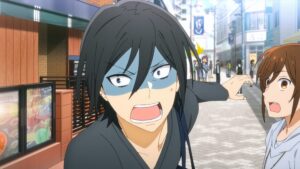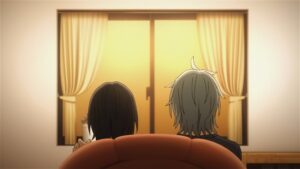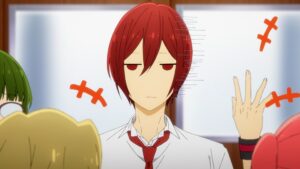This series wasn’t titled “Horimiya” for nothing, as the people whose names comprise that portmanteau are far and away its most interesting characters. Whenever they’re on screen, I’m engaged; whenever they aren’t, I’m thinking about what’s for dinner rather than attending to the show. Thankfully, this week’s episode kept them in focus for the majority of its runtime, but last week’s was so preoccupied with other characters that it gave me writer’s block (hence this double post). I kind of want to start complaining right off the bat, but in the interest of optimism, let’s avoid chronological coverage and jump straight to the three little words that bridged these two episodes.
Miyamura’s confession arrived in the middle of Hori’s illness, which says quite a lot about his character. The show chose to complicate matters by having her feign sleep in the moment, but even the presence of that cliché didn’t dull my appreciation for the show’s timing. Why would he say “I love you” while Hori was sick, and so soon after a half-delirious episode where she addressed him as her mother? It doesn’t seem particularly romantic, but I think that’s the point – Miyamura’s life has been a lonely one, and he’s not going to open himself to the possibility of further rejection by waiting until there’s a level playing field. He alludes to this in episode 5: “Honestly, I was scared to hear how you’d respond.” And while Miyamura is far from the only guy in history to fear the judgment of the girl he likes, we’ve gotten enough glimpses of his childhood to know that he doesn’t have much experience being loved by anyone at all.
The qualifier there is Shindo, his best friend from middle school who saved him from complete ostracization. I wasn’t a big fan of the flashback to the formation of their friendship, as it wasn’t much more complicated than the previous sentence. Nothing in particular brought them together; Shindo simply approached Miyamura with the intention of befriending him. I don’t know about you all, but at my middle school, the number of children capable of such kindheartedness was close to zero. Shindo even told off his other friends for shunning the gloomiest kid in class, which was straight out of the after school special playbook. While it’s true that friendship shouldn’t have to be earned, it also shouldn’t feel manufactured, and this one definitely did.
While I felt a keen lack of realism in those scenes, introducing Miyamura’s closest middle school friend was an appropriate route for episode 4 to take, since it then linked his past relationship with Shindo to his present one with Hori. His reflection on Shindo’s positive influence totally syncs with his attraction to Hori, because she fills a similar role in his life. Miyamura needs acceptance, having been starved of it as a kid, and Hori was only the second or third peer to supply him with it. That she’s smart and pretty are probably just bonuses in his mind. Come to think of it, the show keeps making jokes about how “creepy” his friendship with Ishikawa is, but it makes perfect sense – he forms fast attachments to people who can stomach his presence, because a part of him still believes that those people are rarer than gold.
Hori isn’t such a remarkable specimen, though, at least not where responding to confessions is concerned. Rather than allow herself to be happy at her crush’s reciprocation, she fixates on Souta’s report that Miyamura was walking with some girl on the way to school. First it’s the thought that he might be cheating, then it’s the fact that he only uses her first name. I doubt I need to go into why that second hang-up was so stupid, as misunderstandings are widely understood to be one of the romcom genre’s worst tropes. I do think that Hori struggles with her self-image almost as much as her new boyfriend, though, which might explain her behavior. Where Miyamura was friendless for a good chunk of his life, Hori has been intermittently parentless for most of hers. The memories of her mom’s absence from the home that prompted her breakdown in episode 4 aren’t merely a thing of the past – Yuriko is still primarily dedicated to her job, rather than her family.
We met Hori’s dad in this episode, as well, who comes home so infrequently that she addresses him by his given name. His scenes were packed with jokes about his relative immaturity, but I couldn’t find it in myself to laugh. The man is guilty of serial neglect, and if you need a hint as to how Hori feels about that, rewatch the episode and see just how many opportunities she takes to hit him. Is the mood of the scene angsty? No, but you’d better believe that underneath all that wacky physical comedy lies a whole lot of hurt. Now that the anime’s central relationship has begun in earnest I expect some of that pain to be swept under the rug, but the show has displayed significant interest in the roots of its characters’ emotional lives thus far, so we’re due for more in the future.
(I was going to save my gripes about the boring green-haired student council girl for the end, but this post is already pretty long, so I’ll save them for the day when she actually does something about her interest in Ishikawa. Sakura lovers get off easy this week!)




